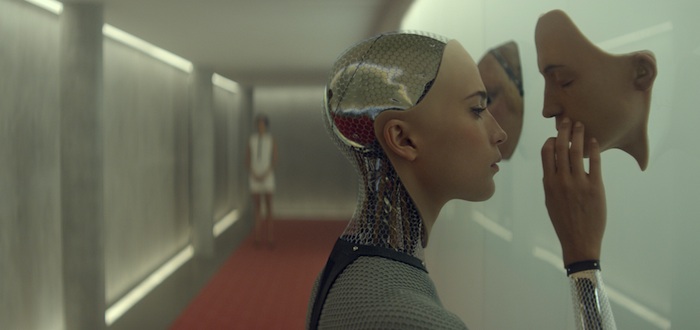VOD film review: Ex Machina
Review Overview
Suspense
8Smarts
8Sex
8David Farnor | On 01, Jun 2015
Director: Alex Garland
Cast: Domnhall Gleeson, Oscar Isaac, Alicia Vikander
Certificate: 15
“If you’ve created artificial intelligence, that isn’t the history of man. It’s the history of gods.”
That’s programmer Caleb to his boss, Nathan, after winning a prize to spend a week on a private work retreat – only to discover it’s really to put a top secret robot through the Turing test. The robot in question? Ava, a female with enough self-awareness to know what she is.
Domnhall Gleeson is fantastic as the naive coder, excited by the technology yet nervous about his boss. Oscar Isaac is equally intriguing as the reclusive inventor, arrogant yet used to drinking alone in his locked-down bunker.
From the moment they first meet, the pair ensure things feel slightly off, introducing an uneasy claustrophobia that’s emphasised by the stunning, isolated home in which almost the entire film takes place. Nathan is polite to the point of standoffishness, providing his guest with a keycard that only accesses permitted parts of the building – “to make things easier” – and insisting that he wants Caleb’s instinctive feelings about Ava rather than a discussion of engineering theories and data.
During Caleb’s conversations with her, though, they start to flirt. Is she meant to? Or is she as human as the rest of us? “Why did you give her sexuality?” asks Caleb early on. “It’s fun,” comes the blokey reply.
What follows is a fascinating psychological thriller, as identity, power and ethics come into play. But that early conversation is where the twisting, thrilling script reveals its biggest surprise: that Ex Machina isn’t about Caleb at all. It’s about Ava.
Writer Alex Garland has always been adept at packing big ideas into genre packages, from the decay of civilisation in 28 Days Later to the spirituality of science in Sunshine. Ex Machina, his first movie as director, is no exception: it’s a feminist tale encased in a sleek sci-fi. The usual, cliched debates of philosophy and human nature that arise in robot flicks are shunted to one side in favour of a striking focus upon sex and the patterned behaviour of men and women.
The starting point of the story, like much of the genre, is inherently gendered: men conceive of women as objects. And so the idea of a man creating an artificial female becomes a natural metaphor for objectification; if Ava is capable of feelings, or manipulating feelings, surely, the men assume, it is because they programmed her to do so. “In between her legs is a concentration of sensors…” explains Nathan, at one point, smugly pleased with his handiwork.
And so we watch as these two guys play with their new toy, a mix of Apple-esque curves and an all-too-real face.
Alicia Vikander, who has increasingly impressed since her breakout turn in A Royal Affair, is typically wonderful as Ava, managing to be innocent and beguiling in equal measure. As we spend more time with her, she seems more human, but Garland toys with us by telling events from Caleb’s perspective. That juxtaposition between protagonist and heroine only adds to the weight of the questions Caleb asks as the experiments continue.
Ava, tellingly, is not the only female in the film: there is also a maid, Kyoko (Sonoya Mizuno), who is unable to speak English. Whether or not she might be an android too is irrelevant. The fact that she is given little attention by the narrative (dictated by Caleb’s gaze) says more than she’s allowed about the hierarchy on display. The fact that Nathan perceives her almost solely as a sex slave confirms it.
As a director, Garland’s attention to storytelling detail is meticulous, with every component helping to build the film’s double-layered depth. The glossy corridors and red lighting caused by power cuts combine with Geoff Barrow and Ben Salisbury’s music to build the intense feeling of confinement. The grey mesh always visible alongside Ava’s “skin” gives her an alien quality that unsettles. While the blokes keeping their clothes on exposes the misogynistic values of his characters, though, Garland crucially saves any candid shots of his female star for one striking scene, when the flesh on show is being chosen by Ava to cover her own body; a private moment not crafted by a voyeuristic creator but belonging to her perspective alone.
Ex Machina is a smart thriller that raises pertinent issues of gender and control. As Ava reprograms the tropes of sci-fi, the resulting narrative isn’t the history of men: it’s the story of a woman.

















